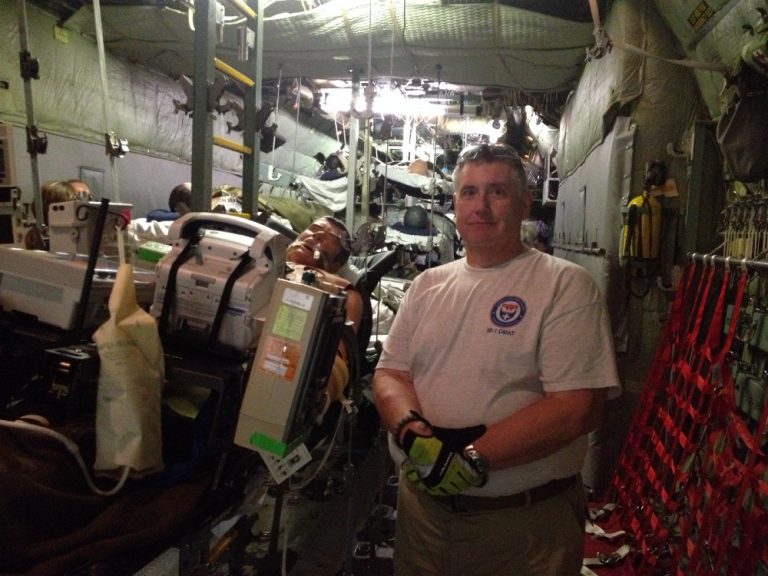
Marc Bush, PA-C is always ready and waiting for a disaster.
He is part of the National Disaster Medical System (NDMS), which some may define as the medical version of the National Guard. In times of crisis, Bush and his colleagues are called to help whenever and wherever their skills are needed, helping to fill the gaps in medical care from hurricanes to earthquakes to global pandemics.
In April, Marc’s five-person team served three weeks in New York City, one of the cities hit hardest by COVID-19. There, he assisted a federal Disaster Mortuary Team (DMORT) to establish a disaster mortuary for the city’s Office of the Chief Medical Examiner. Bush helped the office and staff get through the COVID-19 fight, not by working with those diagnosed with coronavirus, but by taking care of the staff.
“My team and I served as a standby medical team for the examiner’s office,” explained Bush. “We were there to provide medical care and respond to work-related injuries. We were there to help the helpers.”
This was not Bush’s first call to assist during the on-going COVID-19 crisis. In February, he was deployed to help Americans onboard the Diamond Princess cruise ship docked in Japan. More than 700 passengers and crew aboard the vessel contracted the virus. American travelers were evacuated from the ship and then to Tokyo and finally to San Antonio, Texas. Bush was there as they arrived back in the United States.
“We screened them as they got off the aircraft for fever or symptoms [of COVID-19] before they were taken to an air force base,” explained Bush. “Once on base, we monitored the patients, made sure they were fed, had their prescription medications, and so on.”
So far, 2020 has been one of Bush’s busiest years with the NDMS since joining nine years ago.
He first learned about the program following the terrorist attacks of September 11, 2001. Years later, a fellow PA and friend who was involved in NDMS brought it to Bush’s attention again. Having served in the Army full-time for four years right out of high school and then another four years in the Army National Guard, Bush felt the NDMS would be a great way to continue serving his country, so he applied. He now works full-time in family medicine at Cherry Health in Grand Rapids, Michigan, but answers the call whenever NDMS needs him. He has been deployed to help citizens following hurricanes Harvey, Maria and Irma, but also to take care of visitors who needed medical attention during the 2016 presidential inauguration on the Capitol Lawn.
Following Hurricane Harvey in the summer of 2017, Bush was sent to help some 11,000 evacuees housed at a convention center in Houston, Texas. His team served as a hospital to the equivalent of a small city.
“It was very rewarding, very fulfilling,” said Bush of the experience. “We were seeing people who come in with nothing, and showed them a little bit of kindness and concern.”
Just a few months later, he found himself without accessible clean drinking water, transportation, and dealing with intermittent power outages as he helped those affected by Hurricane Maria in Puerto Rico.
“I went from sitting in a warm office to a tent,” he said of his time in the Caribbean territory. “We sometimes had to use what I call ‘MacGuyver medicine.’ You do what you can with what you have. I may not be able to fix everything, but I can help fix my little corner of the world.
